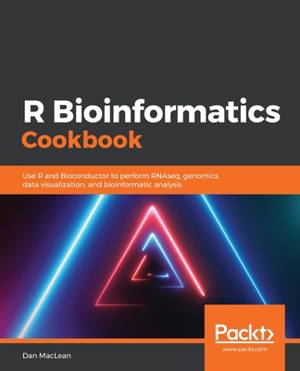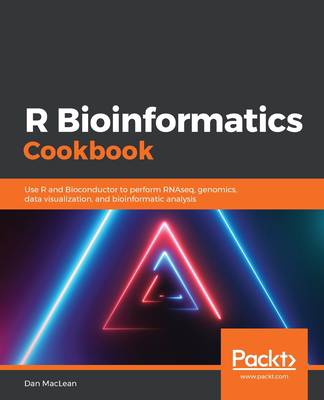
- Afhalen na 1 uur in een winkel met voorraad
- Gratis thuislevering in België vanaf € 30
- Ruim aanbod met 7 miljoen producten
- Afhalen na 1 uur in een winkel met voorraad
- Gratis thuislevering in België vanaf € 30
- Ruim aanbod met 7 miljoen producten
R Bioinformatics Cookbook
Use R and Bioconductor to perform RNAseq, genomics, data visualization, and bioinformatic analysis
Dan MacLeanOmschrijving
Over 60 recipes to model and handle real-life biological data using modern libraries from the R ecosystem
Key Features:
- Apply modern R packages to handle biological data using real-world examples
- Represent biological data with advanced visualizations suitable for research and publications
- Handle real-world problems in bioinformatics such as next-generation sequencing, metagenomics, and automating analyses
Book Description:
Handling biological data effectively requires an in-depth knowledge of machine learning techniques and computational skills, along with an understanding of how to use tools such as edgeR and DESeq. With the R Bioinformatics Cookbook, you'll explore all this and more, tackling common and not-so-common challenges in the bioinformatics domain using real-world examples.
This book will use a recipe-based approach to show you how to perform practical research and analysis in computational biology with R. You will learn how to effectively analyze your data with the latest tools in Bioconductor, ggplot, and tidyverse. The book will guide you through the essential tools in Bioconductor to help you understand and carry out protocols in RNAseq, phylogenetics, genomics, and sequence analysis. As you progress, you will get up to speed with how machine learning techniques can be used in the bioinformatics domain. You will gradually develop key computational skills such as creating reusable workflows in R Markdown and packages for code reuse.
By the end of this book, you'll have gained a solid understanding of the most important and widely used techniques in bioinformatic analysis and the tools you need to work with real biological data.
What You Will Learn:
- Employ Bioconductor to determine differential expressions in RNAseq data
- Run SAMtools and develop pipelines to find single nucleotide polymorphisms (SNPs) and Indels
- Use ggplot to create and annotate a range of visualizations
- Query external databases with Ensembl to find functional genomics information
- Execute large-scale multiple sequence alignment with DECIPHER to perform comparative genomics
- Use d3.js and Plotly to create dynamic and interactive web graphics
- Use k-nearest neighbors, support vector machines and random forests to find groups and classify data
Who this book is for:
This book is for bioinformaticians, data analysts, researchers, and R developers who want to address intermediate-to-advanced biological and bioinformatics problems by learning through a recipe-based approach. Working knowledge of R programming language and basic knowledge of bioinformatics are prerequisites.
Specificaties
Betrokkenen
- Auteur(s):
- Uitgeverij:
Inhoud
- Aantal bladzijden:
- 316
- Taal:
- Engels
Eigenschappen
- Productcode (EAN):
- 9781789950694
- Verschijningsdatum:
- 11/10/2019
- Uitvoering:
- Paperback
- Formaat:
- Trade paperback (VS)
- Afmetingen:
- 190 mm x 235 mm
- Gewicht:
- 544 g

Alleen bij Standaard Boekhandel
Beoordelingen
We publiceren alleen reviews die voldoen aan de voorwaarden voor reviews. Bekijk onze voorwaarden voor reviews.











